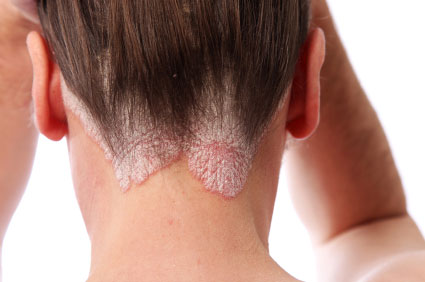Psoriasis is a noncontagious skin disease where thick plaques are formed and responsible for skin scaling. Due to excess proliferation of skin cells, scales are formed on the skin which is caused by inflammatory chemicals produced by white blood cells in the human body. Skin of elbows, knees and some regions on the scalp are severely affected. This chronic autoimmune condition that causes the rapid buildup of skin cells is responsible for scaling on the skin’s surface. Inflammation and redness around the scales can be noticed.
These psoriatic scales appear whitish silver in color and turn into thick and red patches, which may crack and bleed. This skin condition is due to the result of excess skin cell production which grows deep in the layers of skin and slightly rises to the surface of the skin.

Types of psoriasis:
The major types of psoriasis are five, while this diseased condition is discussed below along with their symptoms.
Plaque: This is a common type of psoriasis which is been noticed in about 80 percent of people. Red inflamed patches are produced on several areas of the skin. While these are covered with whitish-silver scales or plaques.
Guttate: Guttate psoriasis is noticed in children which cause small pink spots which are noticed on torso, arms, and legs. These spots resemble the scales seen in Plaque psoriasis.
Pustular: Adults suffer from this disease commonly. The body turns red resulting in skin inflammation which causes white pus-filled blisters.
Inverse: This condition results in skin inflammation and red spots on the body, while some patches are developed under armpits or breast regions, groin and around skin folds in the genitals.
Erythrodermic: Erythrodermic psoriasis is a rare skin condition where the skin appears sunburned covering large areas of the body. Scales are developed enlarged sections where a person suffering from this disease frequently fall ill.

What are the symptoms
The symptoms differ from person to person and largely depends on the type of psoriasis they are suffering. These symptoms differ for individuals and vary according to their immunity level. People suffering from psoriasis go through cycles of symptoms which may last for few days or weeks, and then the symptoms may clear up and cannot be unnoticeable.
The most common symptoms of plaque psoriasis include:
- red, inflamed patches of skin
- silver-white scales or plaques are formed the red patches
- Skin may become dry which may crack and bleed
- itching and burning sensations around the patches
- Joints will swell and you may suffer from pain
Is psoriasis contagious?
This is not contagious and can’t be passed from one person to another. You will not develop this condition by touching a psoriatic lesion on another person.
What is the cause?
Scientists are unclear about the causes of psoriasis. But, after decades of research, they have identified two key factors genetics and the immune system.

Immune system: This may be caused by a defect in the immune system when white blood cells known as T cells attack the skin cells which results in psoriasis. This condition is autoimmune, where white blood cells are deployed to attack and destroy invading bacteria and fight infections. Due to overuse of chemicals, they attack the skin cells. This results in speeding up skin cell production which leads to the production of new skin cells. They are pushed to the skin’s surface, where they pile up.
Genetics: Some people inherit this faulty gene that is more prone to develop psoriasis. If you have an immediate family member suffering with this skin condition, your risk for developing psoriasis is higher. However, the percentage of people who have psoriasis and a genetic predisposition is small.
In general, The life cycle of a skin cell is about a month which eventually fall off. In People suffering from psoriasis skin does not shed the dead cell due to the rapid production of skin cells. There are some rare cases reported that psoriasis affects the nails, the mouth, and also the area around genitals.
The exact cause is not known despite after 30 years of research which still remains a mystery. While scientists say that it may be due to various combination of elements like genetic predisposition and environmental factors. Major role is due to defects in immune system and lacking the ability to control inflammation




Can’t you write simple sentences? Eg.,: “Psoriasis is a noncontagious skin disease where thick plaques are formed and responsible for skin scaling.” Psoriasis is a non-contagious skin ailment. Common symptoms are formation of thick plaques and scaling of the skin. Any technical subject has to be presented in simple sentences so that your reader does not grapple with the words or gasp at the end of the sentence!
Hi prasad thanks for your input will try my level best next time and sorry for the inconvenience you faced and I am glad that you read my articles so deeply and giving your valuable opinion to me.I am grateful